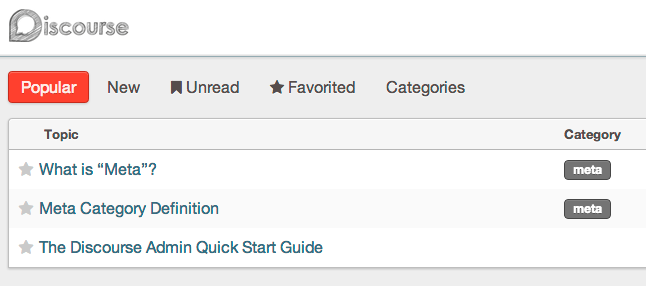The Importance of Meta on Forums
If I learned anything at Stack Overflow, it is the importance of meta to any healthy community.

Meta is the one dedicated area every single forum needs, no matter its size, no matter how obscure it is, regardless how many posts per day arrive. Every forum needs a place to discuss the forum itself.
The category description for meta (which is itself a pinned discussion topic) explains:
Use the 'meta' category to discuss this forum -- things like deciding what sort of topics and replies are appropriate here, what the standards for posts and behavior are, and how we should moderate our community.
We're serious about Discourse being "civilization in a box". That's why every Discourse forum includes exactly one prefab category to start with, the most important one of all: meta.
We wrote an introductory post pinned to the top of the meta category which attempts to explain in a little more detail why meta is so important:
What is "Meta"?
Meta means discussion of the discussion itself instead of the actual topic of the discussion. That is, discussions about...
- The style of discussion.
- The participants in the discussion.
- The setting in which the discussion occurs.
- The relationship of the discussion to other discussions.
Why do we need a meta category?
Meta is where communities come together to decide who they are and what they are about. It is where communities form their core identity and mission statement.
Meta is for the folks who enjoy the forum so much that they want to go beyond merely reading and posting—it's where we work together to help improve our community. Meta is where all leadership and governance forms, a home for debate and evaluating direction.
Meta is also community memory, documenting the history of your community and its culture. There's a story behind every evolution in rules or tone, and these shared stories bind communities together. Meta is the home for all the tiny details that make your community unique: its terminology, its acronyms, its slang.
What kinds of meta topics can I post?
What topics should we allow and encourage? Which topics should we explicitly discourage?
What sort of replies are we looking for? What makes a good reply versus one that is out of bounds or off-topic?
What are our standards for community behavior, beyond what is defined in the FAQ?
How can we welcome new members of our community and encourage them?
Are we setting a good example for the kinds of discussions we want in our community?
What problems and challenges does our community face, and what can we do about it?
How should we moderate our community, and who should the moderators be? When should we flag posts?
How do we publicize and grow our community?
What does does TLA mean? Who was Kilroy and why does everyone drop his name when they make a typo?
How should (or why did) the rules change?
I've heard so many complaints from folks upset about the status quo on forums, who felt powerless and marginalized and disenfranchised. They felt that the forum was run by people they couldn't understand, who didn't care about them. But it doesn't have to be that way -- if there was a dedicated meta discussion area on that forum to freely engage and discuss why the forum works the way it does, and how it could perhaps change or adapt to the community, these users could feel they have an open voice in the forum, not just a tiny slot through which they are sometimes allowed to speak.
There does need to be a thin wall between meta content and the regular forum content. As long as there are only a few meta topics on the home page, that's fine. But if your home page becomes nothing but meta topics, you should consider redirecting or suppressing your meta category a bit so that the actual topics people come to your forum for aren't being overwhelmed by the meta topics discussing the forum itself!
Meta may feel like mandatory administrivia, but it is so much more than that. It's your collective community bible and family history:
A shared history is a large part of what binds individuals into a community and imbues a group with a distinct identity. A history with a narrative thread also helps people understand what is happening around them. "The present," according to the historian and philosopher David Carr, "gets its sense from the background of comparable events to which it belongs ... Discovering or rediscovering the story, picking up the thread, reminding ourselves where we stand, where we have been and where we are going--these are as important for groups as for individuals." Knowing the history of a group to which we belong, in other words, can help us see events, and ourselves, as part of a still unfolding story and of something larger than ourselves.
We ship a meta category with helpful instructions right out of the box in Discourse; it's a crucial part of the Civilized Discourse Construction Kit. If your forum doesn't have a meta, get one as soon as possible – and cultivate it carefully, because that's the only place where governance, leadership, and guidance will reliably form in your community.